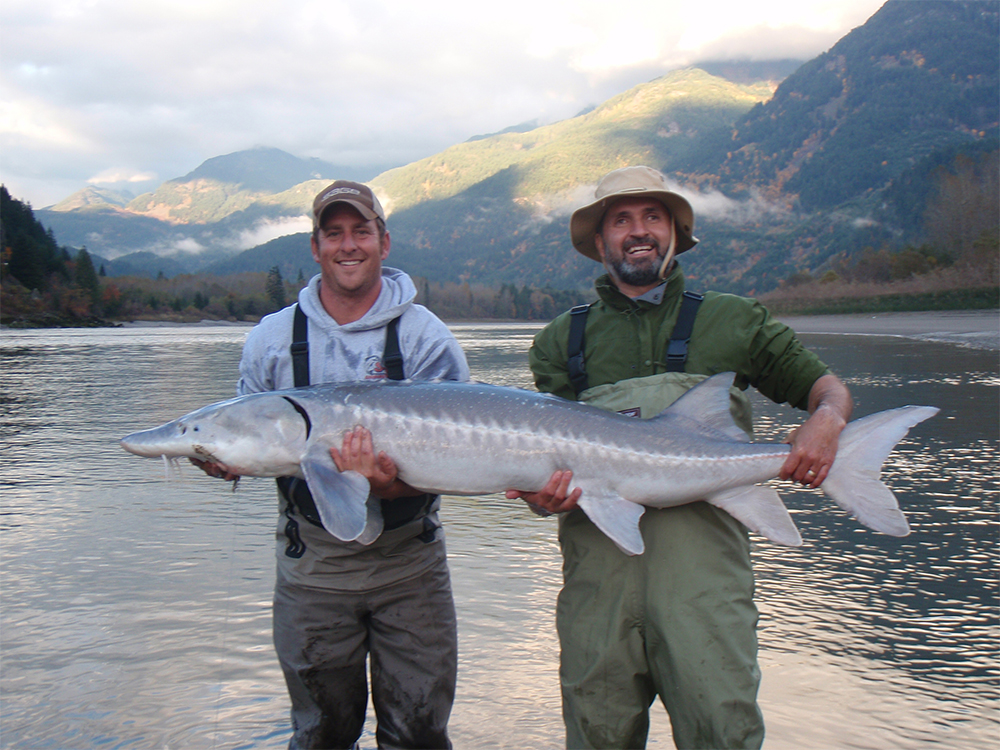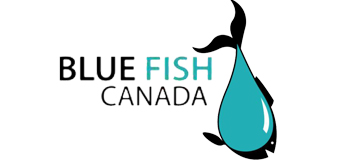Blue Fish News – May 10, 2020
The Blue Fish Canada News for May 10, 2020 focuses on citizen science – the tools, the challenges, and how people who thrive in the outdoors are becoming increasingly effective citizen scientists. We all take pride in following the tried-and-true lessons passed down to us from our mentors and all those who came before, but we also are finding ways to incorporate the new technologies and science-based best practices. It’s all about applying our natural curiosity in ways that satisfies our desire to go fishing while recognizing our responsibility to give back.
Enjoy this week’s Blue Fish Canada Newsletter that includes:
- An exploration of the Fraser River Big Bar landslide that has closed access to important salmon spawning grounds for various Pacific salmon and trout species;
- The latest news about water quality, fish health and the future of recreational fishing; and,
- Citizen science resources and tools that engage and empower outdoor enthusiasts of all ages.

Editor Lawrence Gunther with fishing guide Thomas Rutschman holding a 2-meter Sturgeon caught below Hell’s Gate on the Lower Fraser River
Fraser River Big Bar Landslide:
In the fall of 2018 a landslide struck a remote rugged canyon of the Fraser River north of Lillooet BC. The location was so remote it wasn’t discovered until June 2019 when a group of rafters encountered the slide during the first trip of the year. Huge pieces of rock and significant debris had sheared off a 125-metre cliff, crashing into the river and creating a 5 meter high waterfall. The magnitude of the obstruction impeded migrating salmon from reaching their spawning beds. What’s happened since may go down as one of the greatest emergency responses on behalf of wild salmon anywhere in the world.
Blue Fish Radio first reported on the Big Bar landslide and it’s implication for spawning salmon and trout, and how the blockage will impact the people and watersheds that depend on the successful spawn of these fish. Mr. John Werring and Mr. Brian Braidwood shared their thoughts on the steps being taken to mitigate the impacts of the rock slide and whether it was enough to allow migrating fish passage.
https://www.spreaker.com/user/5725616/e262-fraser-river-rock-slide-blocks-acce
After hearing first-hand the concerns of anglers and conservationists, we tracked down and spoke with the founder of Whooshh Innovations Fish Passage Solution, CEO Vincent Bryan. The Whooshh “salmon cannon” was proposed as a solution, but the timing wasn’t right then. This technology is proving effective around the world at safely and efficiently moving desirable fish species past barriers, while re-routing less desirable species.
https://www.spreaker.com/user/5725616/e263-whooshh-innovations-fish-passage-so
In early April 2019 we spoke with Fisheries and Oceans Canada’s lead on coordinating the multi-government response strategy, DFO Ddirector Gwil Roberts. It turned out to be quite an extensive and detailed overview of how exactly a massive landslide is removed from a river. The progress report was impressive, but also discouraging in that we learned much more work would be required and that this would take time. News: https://www.spreaker.com/user/5725616/e291-an-update-from-dfo-on-the-fraser-ri
Plans in place to facilitate salmon run at Big Bar slide site | NEWS 1130
With around one month to go before this year’s salmon run will reach the site of the 2018 landslide, DFO has been working on three different plans to help the migrating salmon make it past the five-metre waterfall there, and one of these solutions now includes installation of a 160-meter long Whooshh “salmon cannon”
https://www.cbc.ca/news/canada/british-columbia/salmon-cannon-coming-to-help-threatened-fraser-river-fish-bypass-rock-slide-1.5546464
The story of this Big Bar Fraser River salmon impasse is one that will continue for some time to come. Many more millions of dollars and thousands of hours of difficult and dangerous work lie ahead. The consequences of doing nothing would be tragic, which makes this story all the more pertinent during these troubling times. We as a society won’t abandon nature when it needs our collective resources even when we face other more immediate health challenges. We are a strong country made up of determined people who just don’t quit. We learn from our mistakes and live up to our responsibilities. In spite of everything, we have much to be proud of as a country made up of many different peoples.
Links to News about Water Quality, Fish Health and the Future of Recreational Fishing
Water Quality:
Global map to reveal ‘swim ways’ of Earth’s fish – Scienceline
A small team of scientists is creating the first global “swimways” map; a tool they hope will promote stronger policies to save freshwater fish from threats like dams and overfishing.
What’s Bad for Bees Could Be Bad for Marine Life, Too – Hakai Magazine
Preliminary research shows that a popular insecticide hampers arthropods in the ocean.
Saanich crews are tackling Another Colquitz River Oil Spill – Victoria News
This is the 3rd oil spill in the Colquitz River since January. The municipality was notified of the spill Thursday night.
PEI Watershed Group Making Pandemic Adjustments
A conservation group in PEI is changing its work methods to account for the need of personal distancing and other considerations.
Fish Health:
Healthy Season Anticipated for Yukon River Salmon – KUAC
The preseason outlook for Yukon River salmon anticipates a Chinook run similar to the past ten years, but that may not mean good news for Canada.
Striped Bass is a Complex Misunderstood Fish – Coastal Review Online
Striped bass is somewhat of a mystery fish. Much of its complex behavior was poorly understood until recently.
Repeat spawning steelhead has amazing adventures – Post Register
Unlike salmon, steelhead can survive spawning and return to the ocean. If they survive in the ocean and return to spawn again, they are called repeat spawners. Such fish have been tracked throughout the Columbia River which gets its start in Canada.
Fishing:
Eight Fishing Guide Tips for Keeping Clients Safe – Fishing Wire
The American Saltwater Fishing Guide Association has released a list of eight tips to follow for keeping clients safe during the pandemic, with the hope that their industry will soon be able to return to operation.
Spring Fishing Report from the Atlantic Salmon Foundation
Enjoy the disease free wild areas where Atlantic salmon are found this spring across Canada and the Northeastern U.S.
Industry:
Shimano North America’s environmental campaigner Retires – Outdoor Wire
Shimano North America Holding has announced the retirement of its environmental campaigner for over 29 years. Phil Morlock will retire at the end of June as Vice President of Government Affairs/Advocacy for the US and Canada. From the beginning of his near 30 years tenure at the group, he recognised the potential for corporate leadership in environmental conservation, scientific research and government policy as critical for the future of fishing and mountain biking.
NMMA President Urges Boating Industry to Unite as COVID-19 Crisis Subsides
National Marine Manufacturer’s Association (NMMA) president calls on the entire recreational boating industry to work together to ensure the industry exits the pandemic more relevant than when the COVID-19 crisis began.
Uptick in fishing customers seen by bait and tackle shop
Fishing Tackle Market Sees Uptick in Some Categories – ABC News Raleigh NC
With more time at home anglers have been buying more tackle and bait than ever and heading to the water.
Fish-plant job offers seen as a slap in the face by students – Miramichi Leader
Federal student support program now tied to New Brunswick government move to ban temporary foreign workers as NB’s premier maintains unemployed New Brunswickers and students on summer break can do the work.
Calls for Action:
OFAH calls for Ontario to re-open outdoor recreation
Following the release of Ontario’s framework for opening up the province, the Ontario Federation of Anglers and Hunters wrote the Premier to request that sent a letter to the Premier to request that access to the outdoors, including boat launches, provincial parks, and Crown land camping be re-opened as soon as possible during the initial stages of this plan.
COVID-19 Recovery for People and Salmon – Watershed Watch Salmon Society
Join us in calling on our governments to invest in a safer, fish-friendly, green economy. Use our one-click letter writing tool!
Citizen Science On-Line Tools and Resources:
“Citizen Science Means You” – Outdoor Canada
In this special Blue Fish Radio episode brought to you by Outdoor Canada, Lawrence Gunther speaks to a group of grade 10 students about the tradition of fishing and its link to citizen science.
Video and a Guide to Citizen Science Resources – FOCA
The Federation of Ontario Cottagers Association has created a short video about citizen science, and has released a Guide that includes links to a whole range of different monitoring programs across Ontario that you can engage in directly year-round.
Earth Rangers App
Earth Rangers now offers an app for mobile devices dedicated to educating children and their families about biodiversity, inspiring them to adopt sustainable behaviors that now includes recreational fishing thanks to a new partnership with Blue Fish Canada.
An Online History of Atlantic salmon in Lake Ontario
An excellent online presentation details the history of Atlantic salmon in the Great Lakes and prospects and the determined program to bring them back.
EDDMapS Ontario
EDDMapS (Early Detection and Distribution Mapping System) lets ordinary citizens report invasive species. The app has a mugshot and rap sheet for Ontario’s “most wanted.” If you find a suspected eco-invader, just snap a picture. Your phone’s built-in GPS flags the exact location. Then upload your sighting to EDDMapS. Scientists, researchers, farmers, municipalities and environmentalists use your data to monitor, track and remove invasives, and protect the species that belong in the ecosystem.
iNaturalist
For exploring ecosystems around the world, iNaturalist contains over two million sightings of 85,000 species, contributed by a global community of naturalists, scientists and ordinary citizens. It’s an encyclopedia of field guides, with rich resources and projects that will satisfy the keenest nature lover.
Ontario Reptile and Amphibian Atlas
A made-in-Ontario app designed to track of turtles, frogs, toads, salamanders, snakes, and the province’s only lizard. Their numbers are shrinking. In fact, 75 percent of reptiles and 35 percent of amphibians are nationally and provincially at-risk. It takes just 30 seconds to report a sighting. So if you see a snake slide by or a snapping turtle sunning itself, take a pic and send it in. Or get involved in conservation projects like frog surveys and turtle tallies.
Water Rangers App
Use the Water Ranger app to learn about and test waterways using Water Ranger test kits, and then share water data on their open-data platform.
The Wonders of Wildlife Mission Conservation
Wonders of Wildlife is collaborating with Agents of Discovery and several leading conservation organizations to launch a campaign called Mission Conservation. This will provide parents and educators with access to Image Recognition (IR) Missions that young learners can play and share with their community.
About us
You can read current and back issues of Blue Fish News by visiting: www.bluefishcanada.ca
For more about Lawrence Gunther, North America’s only blind professional angler, conservationist, writer, blogger, podcaster, film maker and TV personality, visit: www.LawrenceGunther.com
Gunther founded the charity Blue Fish Canada in 2012 and launched the podcast Blue Fish Radio in 2013.
Please rate The Blue fish Radio Show on Apple Podcast so others will learn of this unique Canadian resource by visiting: https://podcasts.apple.com/us/podcast/the-blue-fish-radio-show/id1090189487?uo=4
Should you have a podcast suggestion or resource you would like to share, please send us a message to: Admin@BlueFishCanada.Ca
Blue Fish Canada is a federally incorporated registered Canadian charity. Please consider making a small monthly donation to off-set the costs of this Newsletter and our other Blue Fish Canada programs by visiting: https://bluefishcanada.ca/donations/
 Blue Fish Canada/Poisson Bleu Canada
Blue Fish Canada/Poisson Bleu Canada
